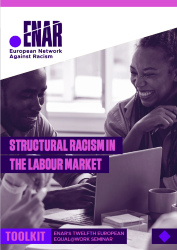
Structural racism in the Labour Market
Subject matter
Structural racism is embedded in society, unfolding in all areas of life. In the labour market, it translates into structural inequalities resulting in racialised people being denied employment, income, and being overly present in precarious and difficult industries and positions. This is not a coincidence. It is the result of Europe’s history of abuses and exploitation of racialised people underpinned by racist exclusionary institutions, policies and practices. Despite many progresses made by legislation prohibiting racial discrimination, best practices from employers committed to diversity and inclusion and advocacy from civil society organisations for an inclusive labour market where all people can thrive irrespective of their racialisation, structural racism continues to have a compounded impact on job prospects and workplace experiences. Racialised people face racism when applying for a job, legal frameworks can limit the positions they are able to fulfil. Once hired, they face all sorts of discrimination, such as microaggression and colour-blindness that can lead to departure, lack of vertical mobility and a very thick “concrete ceiling”, tokenism. These issues are sometimes met with unadapted solutions such as one-sided relationships with civil society organisations or unconscious bias training, that do not manage to achieve the goals set and lead to more harm than efficient solutions.
Method and analysis
The Equal@Work toolkit on structural racism in the workplace is a result of discussions, exchanges, and debates held during the ENAR’s 12th annual Equal@Work seminar, as well as research to collect best practices from professionals. The toolkit was drafted in the aftermath of the widespread public mobilisation led by the Black Lives Matter movement following the murder of George Floyd in 2020. This context was auspicious to an increased interest in anti-racism and a pledge to do better from businesses.
Through a “problem and solution” framework, the toolkit maps out the manifestations of racism in the workplace, analyses the inefficient solutions and examines remaining legal issues hindering racial equity and justice in the labour market. It proposes recommendations to dismantle structural racism in the labour market, alternatives in legal loopholes as well as a long-term strategy for anti-racism in the workplace. The toolkit proposes concrete actionable guidance for employers to critically analyse their organisations and seeking to start implementing anti-racism processes and practices in their workplace.
Report
2022_EqualAtWork_RacismLabourMarket


